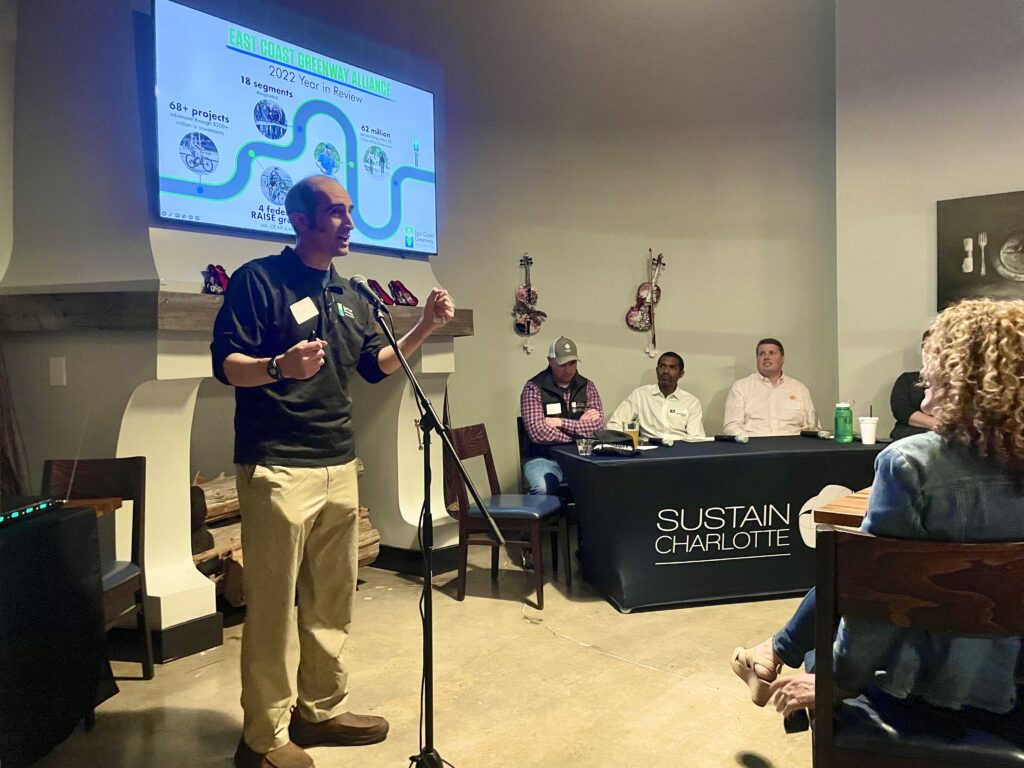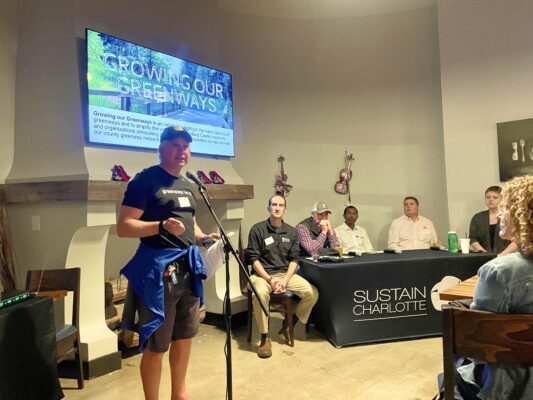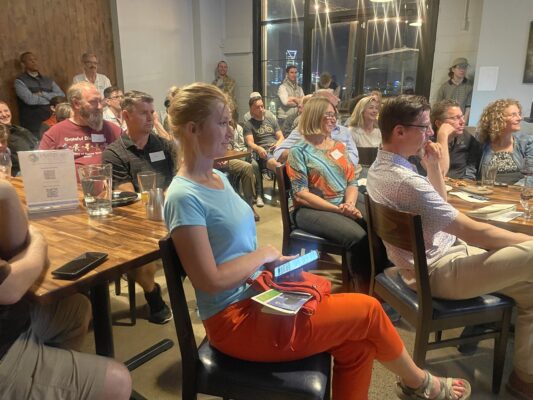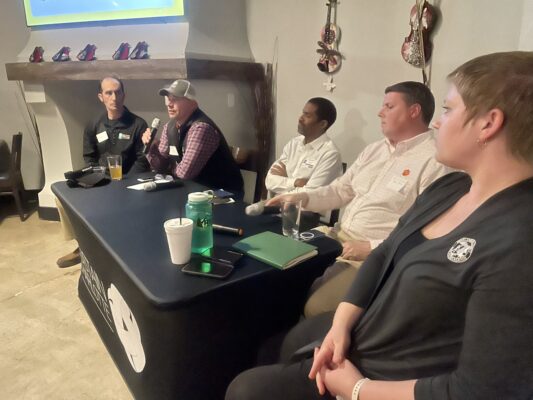Growing our Greenways for all

Dennis Markatos-Soriano, East Coast Greenway Alliance Executive Director, shares the organization’s vision. Photo: Lauren SawyersLast night, Sustain Charlotte hosted the latest program in our Growing our Greenways series, an initiative to highlight the many benefits of greenways and to amplify the voices of Mecklenburg County residents and organizations advocating for equitable and expedited construction of our county greenway network.
The purpose of this event was to explore new ways of funding greenways and options for building them faster. Two of the main goals set forth by the Growing our Greenways initiative are to allocate sufficient resources in the next Capital Improvement Program and enhance organizational support and processes to enable completion of at least 50 additional miles of greenways by end of fiscal year 2028, and to determine and provide the resources needed to substantially complete the Greenway Master Plan by 2035.
This panel discussion was headlined by Dennis Markatos-Soriano, executive director of the East Coast Greenway Alliance, the nonprofit working to build out the 3,000-mile East Coast Greenway to connect 15 states and 450 cities and towns from Maine to Florida. Their Greenways for All initiative is designed to support communities from Maine to Florida in accessing funding for greenways and trails in order to foster a safe walking and biking route along this entire east coast corridor.
Sustain Charlotte, Mecklenburg County Park and Recreation Commission members, Partners for Parks, and Carolina Thread Trail are working together to organize and advance sustainable urban development and improved and equitable access to greenways and public open space for all. Representatives from each organization were on hand to speak at the event.

Mecklenburg County Park and Recreation Commissioner Paul Freestone welcomes attendees and panelists to the event. Photo: Lauren Sawyers
Following an introduction by Sustain Charlotte Director of Engagement and Impact Meg Fencil, Mecklenburg County Park and Recreation Commissioner Paul Freestone welcomed the panel and attendees and set the stage for the evening’s discussion.
“Right now, we have an opportunity to make a generational investment in our future,” he said.
Beth Poovey, Board President of Partners for Parks, who served as moderator for the panel discussion, then introduced Dennis Markatos-Soriano who kicked off his presentation by sharing the East Coast Greenway Alliance’s vision to transform the way people move from Canada to Key West. In its 30-year history, the Alliance has made $2 billion in public investments in this vision.
“Greenways are a top amenity in most communities,” he said. “Our goal is to weave them together – from moose to manatee, palms to pine, blueberry pie to key lime pie. Greenways are about connecting culture, history and nature, and providing members of our communities an experience.”

Event attendees hear from panelists and pose questions about local greenway expansion. Photo: Lauren Sawyers
In 2022, the East Coast Greenway Alliance saw 68 projects advanced through more than $200 million in investments. They designated 18 new segments and won four federal RAISE grants. Thanks to the Alliance’s work, there are currently 62 million people living within 25 miles of the East Coast Greenway.
But there’s much more work to be done. Through the Greenways for All initiative, the East Coast Greenway Alliance is focused on helping communities navigate the many funding programs that are either larger than before or entirely new. They do this through collaborative engagement with municipal agency partners, nonprofit and community partners, and the public. They maintain a focus on underserved communities that often have less capacity to pursue such funding.
In North Carolina, the East Coast Greenway features a 365-mile spine route and a 425-mile complementary coastal route. The greenway has been designated as a unit of the North Carolina State Parks system and as an official North Carolina state trail. Dennis stressed that North Carolina’s Year of the Trail is an excellent moment to get in front of the state legislature and others to encourage the prioritization of the buildout of the greenway network.

Panelists share their perspective on challenges and opportunities for building our greenway network. Photo: Lauren Sawyers
Following Dennis’ remarks, participants heard from Sean Langley, President of the McCrorey Heights Neighborhood Association; Katie Lloyd, Senior Planner for Mecklenburg County Park and Recreation; Hunt Werner, Business Development & Operations Manager at Balfour Beatty; and Bret Baronak, Director of Carolina Thread Trail.
Sean spoke about his personal experience tackling the challenge of connecting his neighborhood in west Charlotte to uptown via a safe, protected greenway given the placement of the highway that serves as a physical barrier.
“I want my family to be able to take the greenway to school,” he said. “We have an iconic neighborhood with a rich history. It’s as much about connectivity for us to uptown as it is for people in the broader Charlotte community to have easy access to us and the history our neighborhood represents.”
Sean is currently working to rally neighbors in adjoining neighborhoods to build a coalition of people interested in achieving this particular connectivity.
Katie provided a brief history of greenway trail development in Mecklenburg County, which goes back decades. Currently, there are 62 miles of existing/developed trails, 15.2 miles under construction, and 18.5 miles in design.
She shared that coordination among all interested parties is often the biggest delay in seeing a greenway segment through from conception to completion. Paul added that land acquisition can be a stumbling block as well.
Bret talked about how the Carolina Thread Trail, a nonprofit organization, is funded by private donations that are used for catalytic grants, or seed money for projects in the 15 counties surrounding Charlotte.
From a development perspective, Hunt shared that a shortage of labor, in addition to funding, is a challenge.
Following a discussion regarding equity and diversity in construction, Paul reiterated the importance of public advocacy.
“We need to purchase 400 acres of land and build at least 10 miles of greenway per year to meet our goal of the completion of at least 50 additional miles of greenways by the end of fiscal year 2028,” he said.
Program attendees, friends and supporters are encouraged to attend an upcoming County budget workshop to advocate for growing our greenway network:
- March 1: 6:30 p.m. at Hickory Grove Rec Center (6709 Pence Road, Charlotte)
- March 8: 6:30 p.m. at Naomi Drenan Recreation Center (750 Beal Street, Charlotte)
- March 15: 6:30 p.m. at Matthews Sportsplex (2425 Sports Parkway, Matthews)
- March 18: 11 a.m. Virtual Workshop (link will be posted on budget.mecknc.gov website and emailed 2 days in advance to those registered)
Register for a budget workshop today.
Watch a replay of this Growing our Greenways event.
Want more information on growing our greenway network? Contact Meg Fencil at [email protected].
Thanks for reading!
As a nonprofit, community support is essential for us to keep doing what we do — including providing free articles like this. If you found this article helpful, please consider supporting Sustain Charlotte so we can continue advocating for a better future and working with residents, neighborhood organizations, government agencies, nonprofits, and businesses to solve the most critical challenges to Charlotte’s long-term social, economic, and environmental health.
Want to stay in the loop? Subscribe to our free, weekly newsletter and follow us on Twitter, Facebook, and Instagram.
